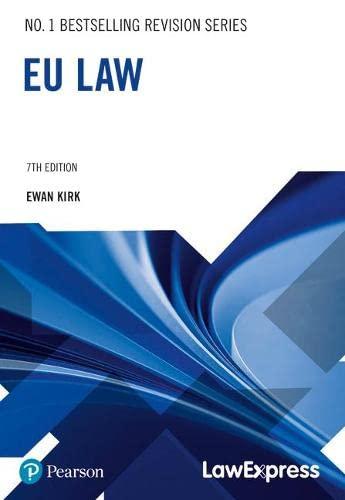Question
The defendant, Union Pacific RR (UPRR), was sued, under the authority of the Federal Employees Labor Act (FELA), by one of its own employees who
The defendant, Union Pacific RR (UPRR), was sued, under the authority of the Federal Employees Labor Act (FELA), by one of its own employees who was afflicted by West Nile virus after being bitten by a mosquito while on the job. After coming down with the virus, William Nami, the plaintiff, could not walk without a cane, could not drive, and had experienced memory loss. He argued that he was bitten by an infected mosquito while working for UPRR outside Galveston, Texas, and next to an area on UPRR's right of way, that was infested by the virus-carrying mosquitoes. He noted that the infestation had been exacerbated by UPRR's negligence in never mowing the grass and allowing the standing water to accumulate. Nami also argued that UPRR did not warn employees about the mosquitoes, did not provide insect repellent, and did not equip employees with long-sleeved shirts. UPRR replied that under the doctrine of ferae naturae,the company was not liable for Nami's illness because he was injured by a wild animal that was not in UPRR's possession. UPRR also claimed that because the danger was commonly understood to exist (Galveston is known by local inhabitants as the "mosquito capital of the world"), the company had neither a duty to warn nor a duty to supply employees with repellent or long-sleeved shirts. UPRR also disputed the claim that it did not mow the grass and that it let the standing water accumulate. Nami argued that UPRR was relying on common law principles, like ferae naturaeand proximate cause, that had been deliberately superseded by FELA, which states that a railroad will be liable for on-the-job injuries to a worker if the railroad "caused or contributed to" a worker's injury just so long as the railroad's "negligence played a partno matter how smallin bringing about the injury." The trial court held for the railroad, but the court of appeals reversed. The case then went to the Texas Supreme Court. Does FELA supersede the Roman law principle offerae naturae,and if not, does the doctrine offerae naturae protect UPRR from liability?Explain
Step by Step Solution
There are 3 Steps involved in it
Step: 1

Get Instant Access to Expert-Tailored Solutions
See step-by-step solutions with expert insights and AI powered tools for academic success
Step: 2

Step: 3

Ace Your Homework with AI
Get the answers you need in no time with our AI-driven, step-by-step assistance
Get Started


